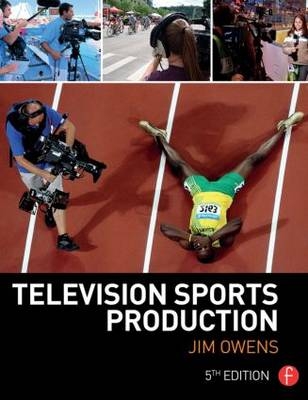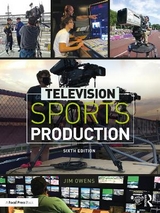
Television Sports Production
CRC Press (Verlag)
978-1-138-78130-6 (ISBN)
- Titel erscheint in neuer Auflage
- Artikel merken
In Television Sports Production, Fifth Edition Jim Owens walks you through the planning, set-up, directing, announcing, shooting, and editing involved with covering a sports event. This manual gives you the tools to effectively cover sports ranging such as football, soccer, and basketball. Tips and advice on using mobile units, cameras, audio equipment, and lighting rigs will enable you to produce live or recorded coverage like an expert and capture professional-quality footage on the first take. After all, there are no instant replays!
This new edition has been updated to include:
Techniques used by producers to capture the essence of individual
Tips on shooting in 3D, 5D, 4k and 8K
Coverage using surround sound and the second screen
Extras such as camera and microphone diagrams and an easy-reference glossary
Author Biography Jim Owens has worked and taught in the video and television industry for over 30 years. His international television work has included fourteen Olympic broadcasts and has taken him to over thirty countries. He is the author of the Video Production Handbook, Television Production, and Television Sports Production and has had over thirty articles published in television and broadcast magazines in the United States and Europe. Owens is Dean of the School of Communication Arts at Asbury University in Wilmore, Kentucky, where he has taught since 1981.
CONTENTS
Foreword xi
Acknowledgments xiii
Preface 1
PART 1 INTRODUCTION TO REMOTE PRODUCTION 5
Chapter 1 What Is Remote Production? 7
Live-to-Tape 8
Remote versus Studio Production 8
Chapter 2 Personnel 9
Personnel Descriptions 9
Freelance Personnel 17
Chapter 3 What is Television 21
Defining Television
Multiplatform Television 23
Platform Integration 25
How is Television Changing 26
Television Formats 26
High Definition Television
3D Television
4K Television
8K Television
Future Television
4-8K 3D
Holograms 26
Chapter 4 The Second Screen & Social Media
What Makes a Good Second Screen 29
Partnerships are Paramount: Case Studies
Social Media
Balancing the Budget 29
Chapter 5 The Mobile Production Unit 27
The Remote Truck Mobile Unit 29
Inside a Remote Truck
Production Area in a Remote Truck 29
Audio Area 30
Record/Videotape Area 30
Video Control Area
IT Structure 31
Outside the Remote Truck
The Compound 31
Virtual Remote Productions 31
The Flypack 32
All-in-One Mobile Production Unit 34
Complex All-in-One Production Unit
Computer Based Mobile Production Unit
Communication Devices 37
PART 2 PLANNING 39
Chapter 6 Planning the Production 41
Coordination Meetings 42
Remote Surveys 43
The Contacts 44
Venue Access 44
Location Costs 46
Electrical Power
Other Areas for Survey Consideration 46
Program Transmission 46
Other Areas that Significantly Impact the Survey 47
Location Sketch 81
Backup Plans 81
Chapter 7 Cameras
Camera Placement
Types of Cameras
Why POV/Robotic Cameras
Camera Set-up Checklist
Camera Shots
Camera Movement
Camera/Lens Moves
Shooting Sports
Composition
Caring for the Camera
Chapter 8 Lighting
Indoor Venue
Outdoor Venue
Other Lighting Concerns
Chapter 9 Audio Production
Stereo Audio for Television
Basic 5.1 Surround Sound
Audio Levels
Microphone Pick-up Patterns
Microphone Sound Generating Elements
Types of Microphones
Phantom Power
Microphone Accessories
Microphone Placement
Gamestime Audio
Communications (Intercom) Systems
Prerecorded Audio
Chapter 10: Graphics
Television Graphics Goals
Tips on Making Great TV Graphics
Viewer Enhancement Tools
The FoxTrax
Virtual Information Graphics
Virtual Ads
RACEf/x
Transposition Replay Systems
StroMotion
Chapter 11: Pre-production and Set-up 85
Production Meetings 85
The Show Format 85
Equipment Set-up 86
Cabling 88
Camera Meetings 91
Facilities Check 92
Schedule 97
Rehearsals 97
PART 3 CREATING THE PRODUCTION 99
Chapter 12 The Production 101
Producing the Remote 101
Directing the Remote 102
Types of Sports Action 102
Action Flow 102
Stop-and-Go Sports 102
Directing Stop-and-Go Action 103
Directing Emphasis on Scoring 104
Pumping 104
Continuous Action Sports 105
Camera Action Tends to Be Rapid 107
Increase in Shot Size 108
Camera Changes During Action 108
Team and Individual Sports 108
Team Sports 108
Individual Sports 108
Building Emotional Involvement 109
Dealing with the Dominant Player 109
Limited Space for Coverage 110
Horizontal versus Vertical versus Circular Action 10
Horizontal Action 110
Vertical Action 111
Circular Action 111
Combinations 111
Coverage Design 112
Follow-the-Bouncing-Ball 112
Needs of the Audience 112
Directing Style 113
Facilities and Coverage 114
Directing Cameras 114
Assigning Cameras 114
Camera Initiative 116
Directing Replays 116
Directing Graphics 117
Shading 126
The Crew 133
Chapter 13: Directing: Telling the Story
Understanding Story
"We Are Going to Add Show Business to Television Sports"
The Sports Director’s Role as a Storyteller
Homework
Storytelling
The Viewer’s Position
Equipment Enhancement
Directing is Like Conducting a Symphony
Chapter 14 Sports Announcing 135
Play-by-Play Sportscast Training 135
Research
Television Announcer Sports Cliches
Announcers and the Broadcast Booth 135
Interviews
Doing the Interview 139
Go Beyond the Obvious 140
Spotters 141
Chapter 15 Post-production 143
Editing Guidelines 146
Chapter 16 Production Safety 147
Trips & Slips 147
Weight 148
Hearing 148
Electrical Power 148
Cables 149
Weather 149
Heights 150
Hazardous Areas 150
Chapter 17 Budgeting for the Remote
Budgeting Case Study
Equipment Rental
Crew Costs
Operational Costs
PART 4 HISTORY OF SPORTS TELEVISION 153
Chapter 11 Milestones in Sports Broadcasting 155
Appendix I Truck Diagrams 161
Appendix II Camera Placement Diagrams 167
Baseball: Small Production
Baseball: Large Production
Basketball: Small Production
Basketball: Large Production
Boxing
Football (American)
Shooting
Soccer/Football: Small Production
Soccer/Football: Large Production
Swimming
Tennis: Small Production
Tennis: Large Production
Volleyball: Small Production
Volleyball: Large Production
Appendix III Microphone Placement Diagrams 197
Baseball: Audio Diagram
Basketball: Audio Diagram
Soccer/Football: Audio Diagram
Tennis: Audio Diagram
Appendix IV Event Storyboards 233
Opening Ceremony XIX Olympic Winter Games
Appendix V Sports Announcing Article 241
Glossary 261
Index 275
| Erscheint lt. Verlag | 24.7.2015 |
|---|---|
| Zusatzinfo | 275 Halftones, black and white; 6 Tables, black and white |
| Verlagsort | London |
| Sprache | englisch |
| Maße | 210 x 280 mm |
| Gewicht | 836 g |
| Themenwelt | Kunst / Musik / Theater ► Film / TV |
| Sozialwissenschaften ► Kommunikation / Medien ► Journalistik | |
| ISBN-10 | 1-138-78130-4 / 1138781304 |
| ISBN-13 | 978-1-138-78130-6 / 9781138781306 |
| Zustand | Neuware |
| Informationen gemäß Produktsicherheitsverordnung (GPSR) | |
| Haben Sie eine Frage zum Produkt? |
aus dem Bereich



